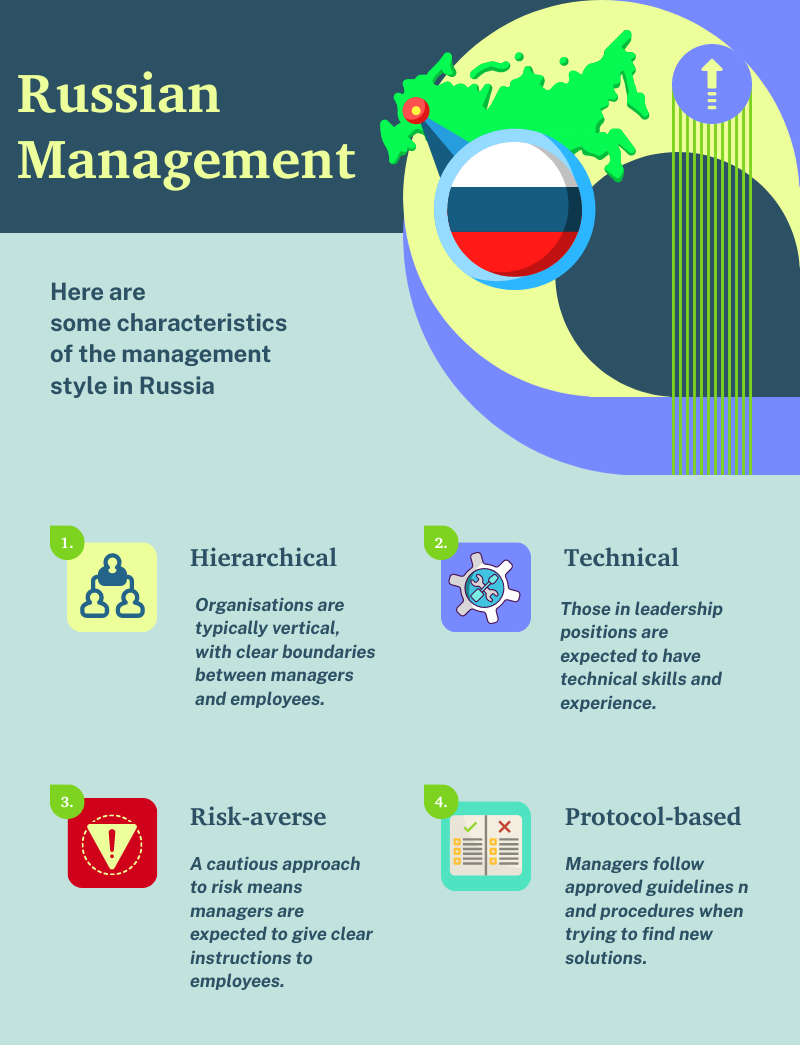
Cross Cultural Management Guide for Russia
The insights offered below are for managers who want to learn more about the management style and business culture of Russia.
It provides some useful information for managers who are relocating to the country for employment, as well as those who may have Russian employees in their global or multicultural teams.
Topics included:
- Hierarchy
- Leadership style
- Time and scheduling
- Communication style
- Negotiation style
Being a Manager in Russia
Cultural agility is essential if you are a foreign manager working in Russia. You need to understand the importance of a clear, straightforward, open and honest approach.
- It is important to establish your credentials and authority quickly since Russians respect both status and technical expertise.
- Although Russians tend to value firmness and dignity, it is also advisable to appear approachable and friendly.
- Generally, Russian business culture values age, rank and following the wisdom of those in authority.
- Managers tend to be autocratic in nature.
The Role of a Manager in Russian Business Culture
As a manager, you will be seen as the person with the knowledge and experience to answer questions and solve problems.
- Relationships between managers and employees are often developed through after-hours socializing.
- Many Russians do not trust people who are "all business" - so it's important to show who you are.
- Meals and entertainment are seen as channels through which to get to know you as a person.
- An indication that you have successfully developed a personal relationship is being asked for a favour.
- Although courtesy is important in all business relationships, this is especially true in Russia.
- Business people have long memories of behaviour they deem insensitive. Small slights that might be overlooked elsewhere are more likely to be remembered.

Get Support from Experts in Russian Management
If you want hands-on help from an expert in Russian management, then take part in a two-hour customised webinar with one of our trainers.
Approach to Change
Russia has a low tolerance for change and risk.
- Cultural sensitivity is important due to this low tolerance.
- In risk-tolerant environments, failure can be perceived as a learning process that encourages confidence in future ventures.
- However, in less risk-tolerant environments, such as Russia, failure can cause a long-term loss of confidence in the individual as well as in others.
Time and Priorities
Russia is a moderate time culture and traditionally schedules and deadlines are viewed as flexible. However, due to the expectations set down by global business practices, Russians adopt relatively strict standards of adhering to schedules.
- When working with people from Russia, it’s advisable to reinforce the importance of the agreed-upon deadlines and how that may affect the rest of the organization.
- Successful cross cultural management will depend on the manager's ability to set an example in terms of getting things done 'on time'.
It's important to be aware of generational differences in Russia. Younger people are often much more willing to break from protocol and try things in a new way.
Decision Making
In general, many organisations retain a strong hierarchical structure. Employees show respect to those in positions of authority.
- Russians generally value age, rank, and protocol.
- Bosses tend to be dictatorial and directive as opposed to consultative.
- Managers expect their subordinates to follow established procedures without question.
- Subordinates do not publicly challenge their manager, as it would make the manager lose dignity and respect.
- Managers tend not to be 100% comfortable empowering employees..
Boss or Team Player?
To operate as a manager in Russia means learning how to be a boss as opposed to someone who gets involved with 'the work'.
- Successful managers will understand the importance of maintaining their positions of authority.
- Subordinates are generally comfortable being dictated to.
- Some younger, more entrepreneurial Russians may find the traditional Russian ways of doing things tiring and time-consuming.
Communication and Negotiation Styles
Meetings and negotiations are deliberated and Russians, especially middle-aged and older Russians, do not like being rushed. It takes time for Russians to 'warm up' towards foreign business people.
- In the first meeting, it is best if you appear dignified and firm, yet approachable.
- Once a relationship is established, allow yourself to be seen as reliable, down-to-earth, and sincere.
- Hierarchy is important to Russians so don't shy away from talking about your experience or status.
- Make sure you have written materials available in both English and Russian to avoid any possible misunderstanding.
- Hire an interpreter if you need to; they can save you a lot of time.
- Be sure to bring all the copies of everything you need from your home country. Faxes, copy machines, and computers may not be readily available outside of Moscow.
- Do prepare your team in advance so that you have a unified front in the meeting.
- Russians may lose their temper, walk out of the meeting, or threaten to terminate the relationship in an attempt to coerce you to change your position.
- Careful minutes, called "protokol" should be taken during the meeting and signed at the end by everyone present.
- Nothing is final until the contract is signed. Even then, Russians will modify a contract to suit their purposes.
- Make sure you have an expert in Russian law review your contract thoroughly.
- Contracts should be translated into both Russian and English.

 +44 0330 027 0207 or +1 (818) 532-6908
+44 0330 027 0207 or +1 (818) 532-6908


